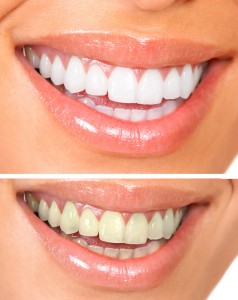
Have your pearly whites taken on a yellow tint? Are you concerned about this color on your teeth? You are not alone. Many Roseville residents want a bright smile, but their yellow teeth get in the way. Why do teeth turn yellow, and how can you prevent this?
Your teeth can turn from white to yellow for two main reasons, and the reasons are related. The first one is well-known: certain foods and drinks can directly stain your teeth. Unfortunately, the worst culprits are also acidic and can wear down the white enamel coating on your teeth.
Cola and other soft drinks, for example, are notorious for staining teeth. They are also highly acidic. In time, their acids can change the color of your teeth by destroying their protective outer layer. This less-common reason for yellow teeth is much more damaging to your dental health.
At its thickest point, tooth enamel is a natural shade of white. As it wears down, it develops translucent qualities that start to reveal the next tooth layer called dentin. This layer has a yellow tone that is darker than the enamel that covers it. The thinner the enamel becomes, the more yellow your teeth will look. Continue reading →

When most people think about cancer, they might not be thinking about oral or mouth cancer and that’s a problem. This year close to 42,000 Americans will be diagnosed with the disease and more than half of them will die within five years. Many of these deaths are preventable. If oral cancer is caught in its earliest stages, it is over 90% treatable.
Risk Factors
Although Americans over the age of 40 are at the greatest risk for oral cancer, the fastest growing segment of the oral cancer population appears to be non-smokers under the age of fifty. This appears to be associated with exposure to the Human Papillomavirus (HPV). Other very high risk groups include heavy alcohol users and people who smoke or chew tobacco. If you fit into any of these categories, you will want to make sure that you are seen by your dentist regularly.
Other risk factors include the following:
Sun/Sunbed/Sunlamp Exposure – especially on the lips.
Diet – data suggests that people who consume too much red meat and high fat foods are more likely to develop oral cancer.
History of radiation treatment (radiotherapy) – particularly in the head and/or neck area.
Chemical Exposure – especially asbestos, sulfuric acid and formaldehyde.
GERD (gastro-esophageal reflux disease) – people who suffer from GERD are at higher risk. Continue reading →
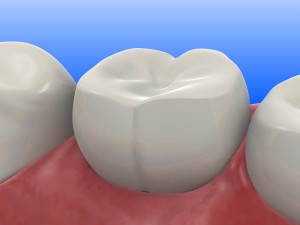
If you care about oral health, you probably spend a lot of time thinking about what goes into your mouth. You should be extra careful about what goes in there permanently. If you choose an unsafe filling, you face years of potentially harmful effects slowly influencing your health over time.
There’s no shortage of reasons to opt for porcelain fillings for your teeth. They are safer than other options while performing well over the long haul. Avoiding cavities is best, but when you do get one you need something safe, strong, and durable. You’ll want to live your life without worrying about the filling and without having to replace it anytime soon.
Some other materials for fillings have unfortunate side effects. While porcelain fillings are natural and safe, the other options out there have potentially dangerous chemicals and other hazards. We recommend porcelain fillings for their performance as well as for the peace of mind they offer in safety. Continue reading →

In the past several years, the number of people who are taking bisphosphonate drugs has steadily increased as medical researchers have made it clear that they offer patients a wide range of benefits. Aside from that, the potency of these new medical products has increased along with their clinical effects. Although bisphosphonates help dramatically reduce the morbidity rates of patients who are currently suffering from long-bone or vertebral factors, many people do not know that they also have hidden side effects that can ultimately ruin their dental treatment.
A Dental Liability
As the number of patients who are taking bisphosphonates increases, there also seems to be an enhanced effect of these drugs on an individual’s maxilla and the mandible resulting in an increased risk of bisphosphonate-induced jaw osteonocrosis. This is a condition found in patients who have either received oral or intravenous forms of this drug because of bone-related conditions.
This often manifests as an exposed nonvital bone that is detrimental a person’s maxillofacial structures. Many dental researchers believe that it is primarily caused by trauma to an individual’s dentoalveolar structures that often have a limited capability for bone healing due to common side effects caused by bisphosphonate therapy. Continue reading →
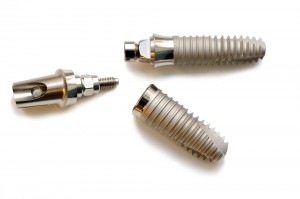
Pain is a common concern among Roseville patients who are planning to get a dental implant. Although any type of dental surgery does come with some degree of discomfort, the majority of patients usually find that the pain they experience from dental implants is only minimal. At the same time, the results are often well worth the recovery process.
An Ideal Solution
A dental implant is often the ideal solution for people who want to replace missing teeth. This is because they feel, perform and look like natural teeth. At the same time, a dental implant can last an entire lifetime with proper care. This can be achieved with flossing, brushing and regular dental check-ups.
A Not-So-Painful-Procedure
Dental implant surgery in Roseville is often performed with either general or local anesthesia. Because of this, the procedure itself is often not painful. The patient’s mouth will be numb as the implant is surgically attached to their jaw bone.
Roseville patients who are concerned about any sort of discomfort during the procedure should ask their dentist about sedative options. This can help them to feel more relaxed while they are in the dentist’s chair. Because of this, many patients report that a dental implant procedure is less painful than a tooth extraction. Continue reading →
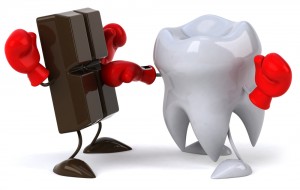
Gum disease is an infection of the tissues and bones that hold your teeth in place. During the early stages of gum disease, you may not have any symptoms. As the problem progresses, you may begin to notice that your gums are red, swollen and tender. You may also experience:
bleeding while you brush and floss
receding gums
separating or loose teeth
pus in the gums or between the teeth
bad breath that will not go away
mouth sores
changes in the way your partials or dentures fit
This disease is typically caused by poor oral care habits. There are, however, other things such as smoking that can contribute to the problem. If gum disease is left unchecked, it can lead to a toothless grin. Here are some ways to treat this condition naturally. Continue reading →

Some wouldn’t believe how many people are afraid of the dentist. However, you don’t fall into this category because you, yourself, are terrified of going to dental appointments. Back when you were young, you had a dentist harshly scold you for the way you held your toothbrush, and you haven’t been back since. Dental hygiene is a necessary part of life, and you can cause serious damage to your mouth and body if you don’t go to the dentist. How can a gentle dentist make the trip more enjoyable and less stressful for you?
Reducing the Anxiety Levels
One of the most difficult parts of going to the dentist is dealing with all of the anxiety that comes before it. You don’t want to be yelled at for avoiding the dentist for years, and you are terrified that the dentist will tell you that you still do not brush your teeth properly. When you choose a gentle dentist, these fears go away. You know that the dentist’s gentle tone will soothe you and that he or she is not going to yell, scream or carry on. Advice will be offered in a sensitive manner. Continue reading →
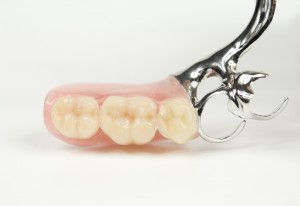
Whether you’ve lost a tooth to an accident, decay or gum disease, you have three options for replacing it: a removable partial denture, a fixed bridge or a dental implant.
Removable partial denture
The most economical way to replace missing teeth, a single removable appliance can replace several missing teeth as long as there are solid teeth on both sides of the partial denture. Removable dentures aren’t as comfortable as fixed bridges, and the clasps that keep them in place may not be completely concealed. The quality of partial dentures vary, from inexpensive plastic “dental flippers” with a false tooth attached to the more sturdy metal and acrylic “Nesbit.”
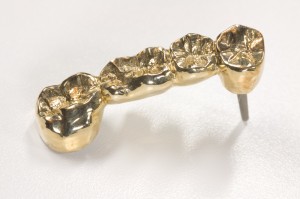
Fixed bridge
More expensive than a removable partial denture, a fixed bridge is a permanent option for replacing a missing tooth. The teeth on either side of the missing tooth are treated for dental crowns, which are then attached to the teeth and have a false tooth between them. Fixed bridges generally look and feel like your real teeth. The main disadvantage is that the teeth it’s attached to must be filed and prepared for the crowns, whether or not these teeth are healthy. Continue reading →

“TMJ” refers to Temporomandibular joint disorder. The Temporomandibular joint connects the lower part of the jaw, the mandible, to the temporal bone in the skull. TMJ is a term that covers a variety of chronic or acute pain or inflammation in the muscles surrounding the temporomandibular joint.
Some common symptoms of TMJ include:
- Pain or discomfort when biting, chewing, or speaking
- Popping or clicking sounds when opening and closing the mouth
- Headaches or migraines
- Limited mobility of the jaw
- Swelling in the face
- “Earache” or generalized pain around the ears
- Ringing in the ears Continue reading →












